Should there be a Ban on Disposable Vapes?
The Early Stages Of The Vape Market In The UK
I am a business owner in the vaping industry, and in this post I am asking the hotly discussed question – should there be a ban on disposable vapes?
I have been selling e-cigarettes and related products since 2013 when the UK vaping market was still in its early stages. Back in 2010, we had experimented with ‘cig-a-like’ products, but the industry was in its infancy, lacking the volume and advanced product technology we see today. At that time, there was limited success in using available products as smoking cessation devices.
Around mid-2013, we had a chance encounter with a business acquaintance from our previous industry, and this led us to look at vaping once again. General awareness of Vaping and product quality began to evolve and improve, so within a short period, our business began to thrive and grow. During these early days of the UK vaping market, most hardware, accessories, and vape liquids were imported from China, and the choices available were much more limited compared to what the market would offer in the years to come.
Growth and Evolution
Between 2014 and 2016, the UK vaping market gained significant momentum. While Chinese hardware still played a crucial role, vape liquids started to improve with the emergence of manufacturers from the UK and particularly the USA. As the quality of liquids improved, the overall user experience became better, and the advantages of vaping over smoking became increasingly apparent. Vaping not only offered a potential path to quit smoking but also presented a more cost-effective and socially acceptable alternative.
The minimum age of sale for vaping products, including e-cigarettes, was introduced in the UK in October 2015. This regulation made it illegal to sell e-cigarettes or vaping products to individuals under the age of 18 in both England and Wales. This measure aimed to restrict access to these products for minors and reduce the prevalence of vaping among underage individuals.
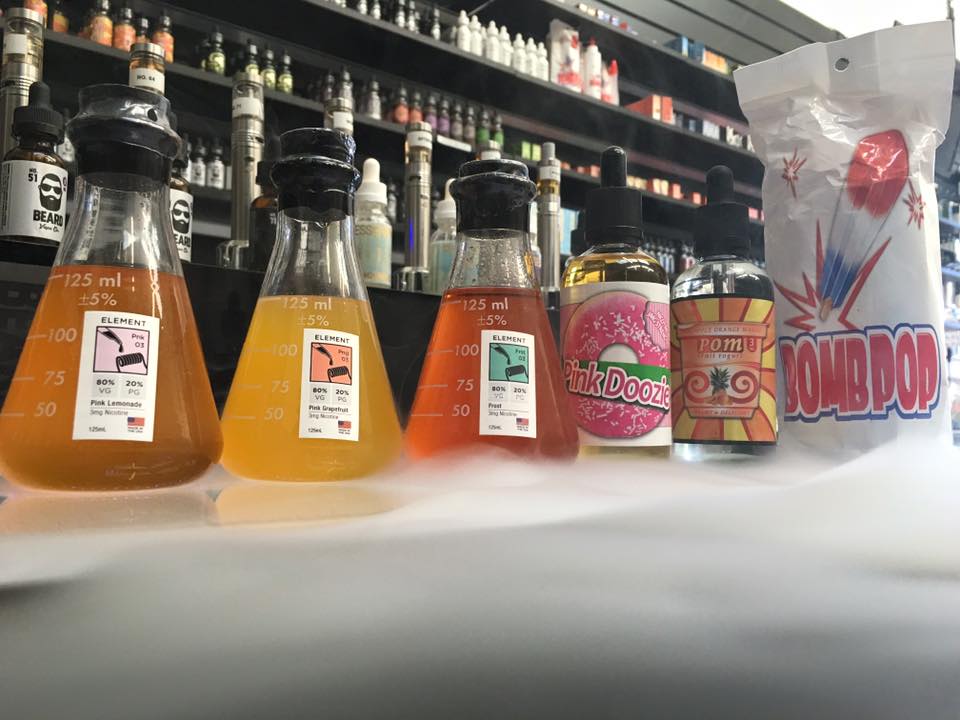
Introduction of regulations via the Tobacco Products Directive (TPD)
Vape shops and businesses began popping up nationwide, and the industry thrived despite being largely unregulated. In 2016, the European Union introduced the Tobacco Products Directive, bringing much-needed regulation to our industry. This directive resulted in changes such as reduced bottle and tank sizes, limits on nicotine strengths, and stricter rules on e-liquid components. Vape manufacturers had to comply with these regulations, testing their products and registering them with the MHRA (Medicines and Healthcare Products Regulatory Agency).
Restrictions from the TPD included:
• Setting a maximum nicotine strength at 20mg or 2% for e-liquids.
• A volume limit of 10ml is imposed for e-liquids containing nicotine.
• Limiting tanks or pods to hold a maximum of 2ml.
• Prohibiting substances such as diacetyl, caffeine, taurine, and specific colourings.
• Clear nicotine labelling is required on vaping devices and e-liquids to enhance clarity.
• Mandating the registration of all new e-liquids with the Medicines and Healthcare Products Regulatory Agency (MHRA) before they can be sold
The rise of the “short fill” market as a response to regulations
The stricter testing and regulations applied to products containing nicotine led to the rise of what became known as the “short fill” market. Short fills are larger bottles of e-liquid that are nicotine-free (outside of TPD regulations), allowing users to add a nicotine shot to the liquid to satisfy their nicotine cravings. The short-fill market experienced significant growth in the following years due to its wide variety of flavours and the cost-effectiveness it provided compared to traditional smoking.

Vaping as a Smoking Cessation Tool: Recognition by NHS and the Quit 4 Life Initiative
The vaping industry’s growth was rapid, with vaping being promoted as a healthier alternative to smoking. Despite this, it was still advised to avoid starting the habit if possible. In Hampshire, the NHS launched the Quit 4 Life initiative, a dedicated clinic for individuals seeking to quit smoking. Participants of this initiative received a voucher, similar to a prescription, redeemable at local vape shops participating in the program.
These vape shops played a crucial role. They didn’t just supply the necessary vaping products; they also provided invaluable advice to those committed to quitting smoking. By equipping smokers with vape devices and e-liquids, these shops were instrumental in setting individuals on their journey towards smoking cessation. This initiative highlighted the significant strides made in the vaping market, the advancements in vaping technology, and the NHS’s acknowledgment of vaping as an effective tool for smoking cessation. It underscored the potential of vaping to lower health risks and diseases associated with smoking.
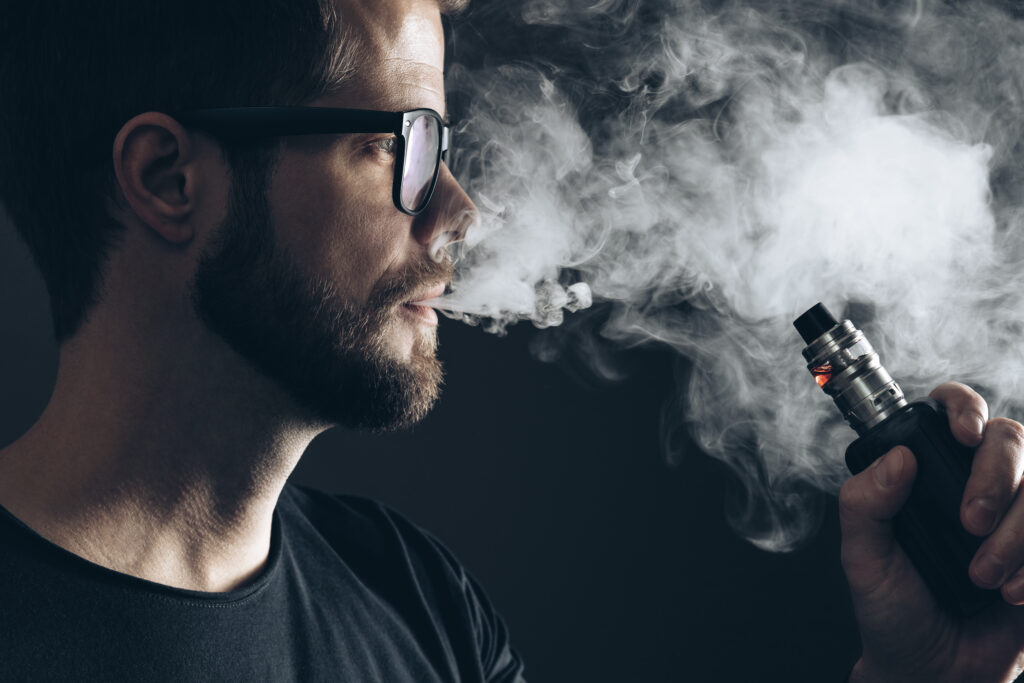
A Self-Regulated Industry?
As the vape exhibition circuit grew, companies ventured globally, targeting emerging markets like Russia and South America. During this period, the industry managed to keep a low profile in the media and effectively self-regulated. Reports of shops breaking underage access rules or entities illicitly dealing in over-the-limit nicotine products were rare. Calls for bans on disposable vapes or any vaping products were virtually non-existent.
However, there were isolated cases of companies importing and selling high-strength 50mg Juul pods from the USA. These instances did not last long, due to limited demand and the vigilance of trading standards and regulatory bodies, like Ireland’s HSE. These authorities acted against such products, removing them from the market and maintaining the industry’s self-regulatory status.
Emergence of Disposable Vapes in the UK
The UK market saw the arrival of disposable vape bars in the latter half of 2021, marking a notable development. While these were termed as the “first” of their kind, it wasn’t entirely accurate. Disposable ‘shisha’ bars had been available since 2014, but their popularity was minimal compared to the surge seen with the new entrants. Initially, the demand for these disposables grew at a steady pace. However, a significant turning point came, leading to an explosive increase in sales. The Elf Bar range, in particular, played a crucial role in this growth, expanding its flavour offerings and increasing its market presence.
At this early stage, there were no widespread calls for a ban on disposable vapes. Yet, as their popularity and the associated concerns grew, so did the voices advocating for regulatory action.
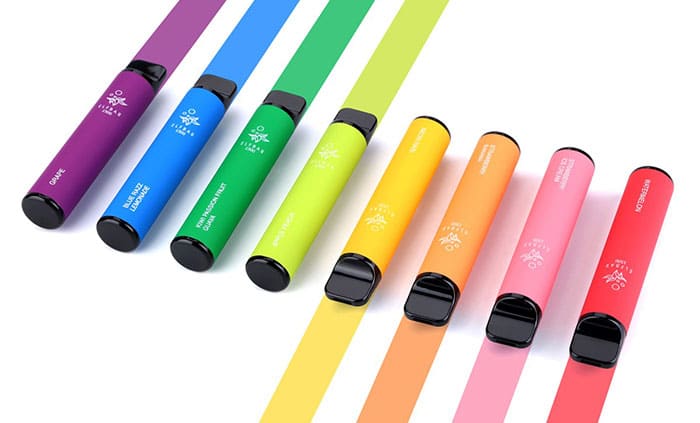
Concerns Regarding Manufacturing, Nicotine Dosage, and Marketing Targeting Youth
The rapid ascent of disposable vape sales, largely manufactured in the Far East, has raised significant concerns. Reports of products containing nicotine levels above the legal 20mg limit and oversized tanks have become increasingly common. Moreover, the design and branding of these disposables often seem aimed at attracting younger users, undermining the vaping industry’s progress. This shift threatens to unravel the advancements made in responsible vaping practices and regulatory compliance.
Shift in Vaping Accessibility: Impact on Industry Standards
Traditionally, vaping products were sold in specialist vape shops, staffed by knowledgeable individuals well-versed in industry standards and regulations. However, the landscape has changed dramatically, with vapes now available in a variety of non-specialist venues across the UK. Disposable vapes, with their straightforward sales approach, require no specialist knowledge from sellers or buyers. As a result, these products are being sold in places ranging from fish and chip shops to nightclubs and even vending machines.
This broad availability has led to a dilution of industry standards, where the sale of vaping products no longer necessitates an understanding of the product or its legal requirements. The ease of selling disposable vapes has posed the question of whether the industry has taken a significant step backwards, compromising the strides made towards responsible vaping and adherence to regulatory standards.

Negative Impacts and Underage Vaping
The rise of disposable vape products has led to unethical sales to individuals under 18, shifting media perspectives on vaping from largely positive to increasingly negative. This shift echoes the controversy that surrounded the Juul device in the United States, particularly its association with underage users.
Similarly, the UK vaping industry faces scrutiny for underage vaping, reminiscent of traditional smoking’s allure in 1950s Britain. A notable disposable vape brand exacerbated this issue by promoting its products on social media and distributing free vape bars in nightclubs, diverging from the compliance-focused practices of established vape suppliers.
The convenience, simplicity, and discretion of disposable vapes have contributed to their popularity among the youth. These devices can be easily hidden, allowing for discreet use and fuelling concerns over underage vaping, nicotine addiction, and the use of terms like “epidemic.”
Media Scrutiny and Negative Perception Due to Underage Vaping
The BBC Panorama program aired “Teenage Vaping: What’s the Harm?” in September, offering a troubling glimpse into underage vaping. The episode revealed school-aged children discussing their vaping frequency and addiction. The Headmaster of Wellington School in Greater Manchester highlighted vaping as a significant issue, noting the challenge posed by the discreet nature of disposable devices. The school invested £20,000 in vape monitors to detect and prevent on-premises vaping, underscoring the serious measures being taken to address this problem.
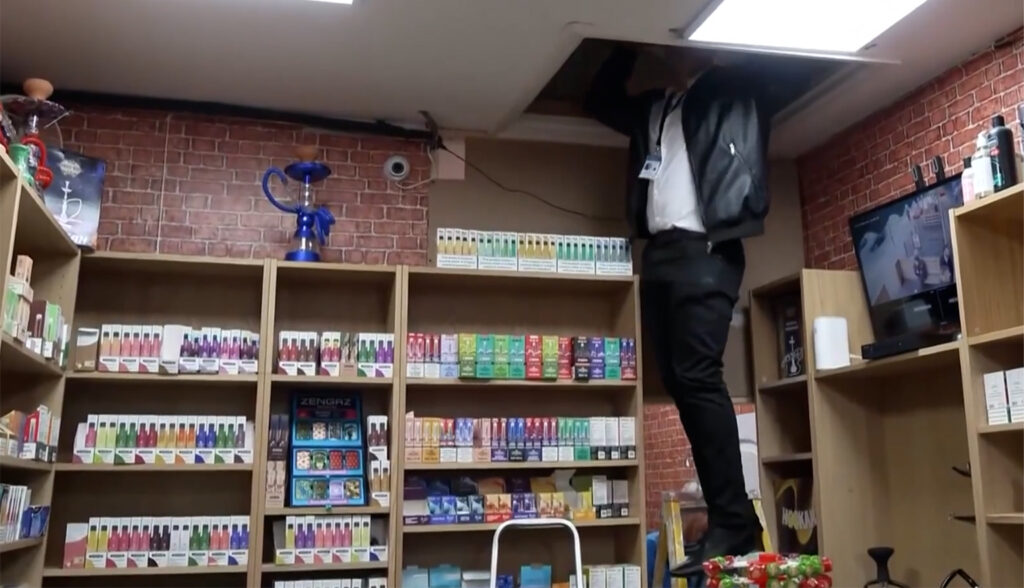

Concerns About Rising Data on Youth Vaping
Recent NHS data indicates a worrying trend: the use of e-cigarettes among 11 to 15-year-olds in England has increased from 6% in 2018 to 9% in 2021. Interestingly, the research found that 21% of 15-year-old girls are current e-cigarette users, compared to 14% of boys the same age. Although girls have higher rates of vaping and smoking, the gap narrows for smoking. It’s noted that those who had smoked were more likely to vape. However, 13% of e-cigarette users had never smoked, and 34% had only tried smoking once.
Experts warn that teenage vaping could lead to nicotine addiction. Yet, the overall number of pupils who have ever smoked dropped from 16% in 2018 to 12% in 2021. Regular smoking in school years seven to eleven is now at 1%. The Government’s goal is to reduce smoking among 15-year-olds to 3% or less, down from 5% in 2018 and significantly lower than 30% in 1996. This reduction contrasts with the rise in vaping, despite a minimum age of sale for e-cigarettes being introduced in 2015. About 57% of regular vaping pupils say they buy their vapes, mostly from newsagents.
Views from Experts, Industry Representatives, and Government Officials
John Dunne, director general of the UK Vaping Industry Association (UKVIA), spoke on Panorama and discussed the potential ban on disposable vapes. He suggested imposing £10,000 fines for selling vapes to minors but opposed banning disposables outright. While this proposal seems valid, it’s uncertain if Trading Standards has enough resources for effective enforcement.
A Missed Opportunity
During my recent visit to the UK Vaper Expo, a significant change was apparent. Many traditional vaping companies, including my own, seemed to have vanished, replaced by newcomers and a large number of Chinese exhibitors. I noticed unauthorised disposable products with oversized tanks and packaging likely to appeal to young vapers.
The UKVIA and expo organisers missed a crucial chance to enforce vaping regulations. They could have clearly communicated that illegal products were not welcome at the NEC. Collaborating with Trading Standards, especially when the show was open to the public, would have offered a vital opportunity for inspection.
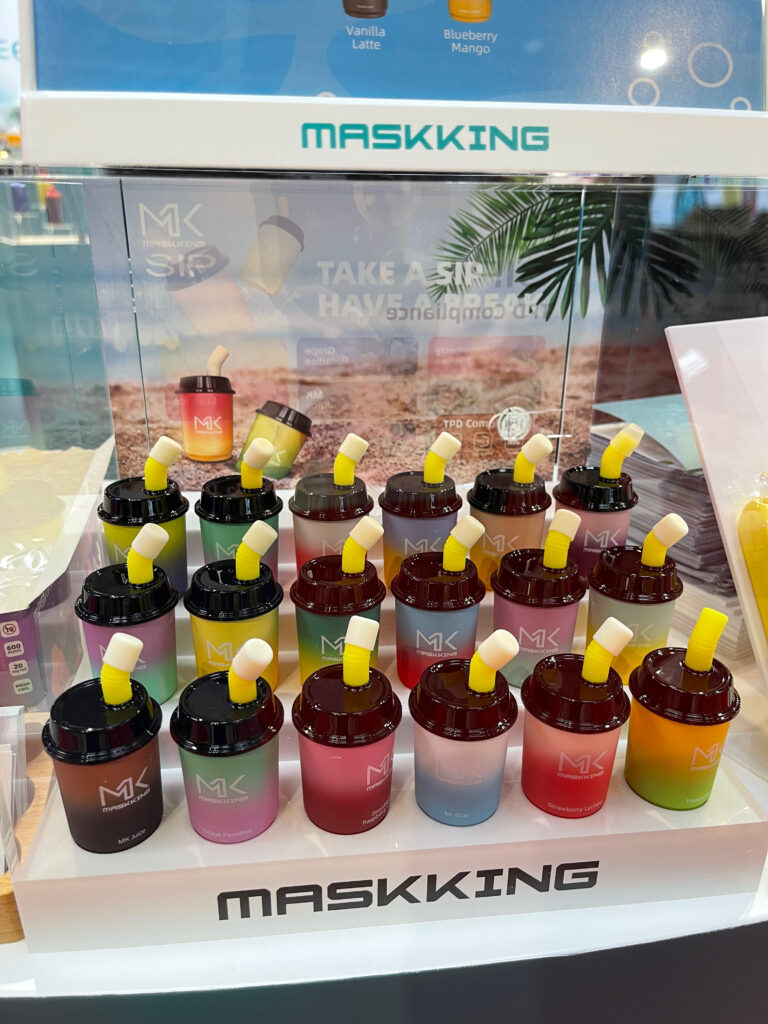

Witnessing Compliance Enforcement at an Exhibition
At an exhibition in Hannover, I observed firsthand the impact of strict compliance enforcement. When the expo opened, the first visitors to booths violating licensing regulations were legal representatives from a global corporation. These non-compliant booths faced immediate closure, received legal notices, and the violators were escorted away. This decisive action conveyed a strong message, proving to be an effective deterrent.
Proposals for Fines, Licensing, and a Ban on Disposable Vapes
In the UK, 250 lives are lost daily due to smoking-related causes. Recognised as a cessation tool that’s twice as effective as others, vaping’s role is pivotal. Hence, contemplating a ban on disposable vapes demands thoughtful deliberation. Assessing their significance in aiding adults to quit smoking is crucial. Should their impact be substantial, seeking alternatives to reduce underage usage becomes imperative.
Currently, the UK Government is engaging in an 8-week consultation period regarding the regulations on vaping. Eager anticipation surrounds the outcomes, with speculations about potential bans on flavours and the introduction of stricter packaging standards.
Wes Streeting, the shadow Health minister, spoke at the Labour Party Conference in October. He recognized the potential benefits of vaping for quitting smoking but expressed concerns over youth-targeted packaging and underage sales. He discussed imposing financial penalties or a licensing scheme, as advocated by the UKVIA. Streeting urged the industry to address these issues to avoid stringent government regulation.
Environmental Impact of Disposable Vapes
Disposable vapes pose significant environmental challenges in the UK, contributing to electronic waste. Each device, containing a lithium battery, adds to the growing electronic waste issue. With around 1.3 million disposable vapes thrown away weekly in the UK, the environmental implications are severe. Despite UKVIA’s efforts to promote proper disposal, the issue persists. The environmental impact encompasses not just the devices but also their packaging and associated materials, raising sustainability and ecological footprint concerns within the disposable vape industry.

Varied Global Approaches and Regulations in Other Countries
The global stance on vaping varies significantly. In China, local sales of fruit-flavoured vapes are banned, yet they are produced for export. France is moving to ban disposable vapes to tackle smoking-related deaths and youth appeal. Ireland, recently enforcing an age restriction of 18, is in a consultation period for further regulations. Belgium bans online sales, while Germany restricts flavoured heated tobacco products. New Zealand has banned most disposables and limited marketing to children. Australia enforces strict regulations, including vape prescriptions and flavour restrictions.
Balancing Regulation and Harm Reduction
The Australian Broadcasting Corporation (ABC) reported on Australia’s black market for vaping products through the Four Corners program. Despite needing a prescription for nicotine e-cigarettes, a surge in black market availability has been noted. This market flourishes online and underground, bypassing legal restrictions. The investigation highlighted the difficulty of controlling this market, raising safety and quality concerns for unregulated vape products. It shows how stringent regulations can unintentionally foster a risky black market.
In 2020, the USA banned flavoured vapes to prevent underage vaping, as per the FDA. This ban, however, spurred a black market for these products. Flavoured vapes became available through unofficial channels, exploiting the demand for banned products. This unregulated market poses risks regarding product safety and quality, demonstrating the enforcement challenges authorities face.

Concerns About the Potential Impact of a Ban on Disposable Vapes
The idea of strict regulations on vaping by our Government is worrying to many in the vaping community. There’s fear that too much regulation could push vapers, who’ve quit smoking, back to cigarettes. It’s important to recognize the significant decrease in smoking rates in the UK, from 19% in 2013 to 14.9% in 2021, as reported by Public Health England (PHE) and the Office for National Statistics (ONS).
Public health campaigns, support for quitting smoking, and tighter regulations have all played a part in this decline. Predictions for 2023 suggest smoking rates could drop to 14%. However, harsh vaping regulations might reverse this trend, by deterring smokers from switching to vaping. A balanced regulatory approach is crucial to maintain public health progress while addressing concerns about youth vaping.
Industry Perspective and Advocacy Against Disposable Vapes
I and many in the vaping industry call for an immediate ban on disposable vapes. The industry was self-regulating effectively until single-use devices emerged in 2021. Banning these products would significantly cut underage vaping in the UK.
Addressing Conflicts of Interest Within the Vaping Industry
While acknowledging some actions by the UKVIA, it’s clear that their interests may be self-serving. Their membership includes companies deeply involved in the disposable vape market. The recent addition of Gold Bar, a Dubai-based brand focusing on disposable vapes, highlights this conflict. Their involvement raises questions about the industry’s advocacy and priorities.

Challenges in Enforcing Regulations and Widespread Availability of Non-Compliant Products
Disposable vapes are easily found across UK retailers, posing significant challenges. Trading Standards acknowledges that not knowing the rules is no excuse. Yet, the vast scale of the issue makes enforcement difficult. Many convenience stores openly sell oversized, illegal disposable vapes. Advertisements, social media, and websites often promote devices containing more nicotine than the 20mg/2% legal limit. Though Trading Standards has conducted raids, these actions barely touch on the broader problem threatening our industry with potential legislative changes. The NHS report raises concerns, especially if 57% of vaping pupils buy their vapes from newsagents.
Proposals for Licensing and Reporting Systems for Compliant Retailers
Licensing vape shops is vital. It would allow those knowledgeable in the industry to help regulate the market. A reporting system for vape retailers to flag non-compliant companies to Trading Standards could also enforce regulations. Like alcohol or tobacco sellers, vape retailers could face severe fines or lose their licenses for not following rules.
Final Thoughts on the Necessity of Eliminating Disposable Vapes for the Industry’s Well-being
The rise of disposable vapes reflects the UK’s disposable culture. Traditional vaping, involving UK-made e-liquids and maintenance of tanks, coils, and batteries, doesn’t appeal to the younger generation. Adults who have tried vaping had access to diverse, efficient, and economical options, unlike the disposable trend. Concerns about a move back to smoking if disposables are banned usually come from those invested in disposables.
Flavours and traditional vape devices have been effective in helping smokers quit without attracting today’s youth vaping culture. Banning disposables could redirect sales to vape shops, where expertise is higher compared to general stores.
The debate continues, but I firmly believe disposables should be banned. This might happen after the government’s consultation period ends later this year.
